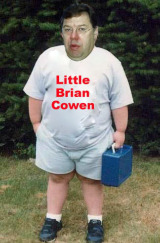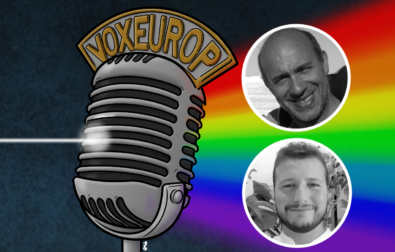Newsweek’s lauding of Irish prime minister Brian Cowen raised more than a few eyebrows in Ireland but do any EU countries get reasonable press abroad?
A good proportion of my work is as a foreign correspondent. In my own country. That is to say, I have the job of writing about my home for a foreign audience, something that is at turns a luxury and a curse. Every day the same questions go through my head: is the latest miniature political scandal worthy of reporting on? Does the latest failed bomb by the Keystone Kops-esque republican microgroups have any broad significance that means foreigners should know about it? Usually the answer is no (and, as a result, my bank account remains a yawning maw from which nothing returns) but it is important to ask the questions nonetheless.
Just as every trivial piece of information from our lives is not worth reporting to our friends, families and even spouses, news of the world is shaped in concentric circles. If an event doesn’t penetrate the outermost rings then it’s likely that few outside the immediate area really need to know. In this I at least have an advantage – and a disadvantage. I know my country’s history and the general shape of its current affairs. Unfortunately I also find some things interesting that are simply dull to outsiders.
So what, then, am I to make of foreigners’ views of my own country?
One major newspaper, reporting on a spate of dissident republican attacks in 2009 (that I also covered) couldn’t tell the difference between the Official IRA and the Provisional IRA. I’m certain most people outside Ireland can’t, but that’s no excuse for a reporter making such an elementary mistake, an error compounded by the fact that the attacks were not carried out by either group as both have been inactive for some time and were only mentioned for contextual purposes. The end result? An incomprehensible – and factually inaccurate – alphabet soup of IRAs read by millions of readers of a newspaper that really should know better.
If a newspaper reporter can’t explain the genesis of the new IRAs and their relationship to their former comrades then why even attempt to explain it in the first place? The problem, as far as I can tell, seems to have been that the reporter simply had no clue about Irish history and politics, things that he should either have known before taking the job or made a serious effort to learn before penning his first missive home. There is nothing unique in this. Readers of the Exile Bookby Mark Ames and Matt Taibbi will find countless examples of similar phenomena in coverage of Russia during the turbulent 1990s.
Outside of questionable reporting, though, there is a broader issue. Newsweek magazine recently ranked Irish taoiseach (prime minister) Brian Cowen as the fifth best leader in the world. Cue absolute incredulity across the nation where Cowen is regarded, at best, as incompetent and, at worst, as the man behind the county’s seemingly endless slide back into penury.
Rightly or wrongly, Cowen is held responsible – yes, along with his party, but also personally – for Ireland’s woes.
Ironically Newsweek likes him for precisely the reason the Irish don’t: his scorched-earth cost-cutting measures when it comes to public services but endless largesse when it comes to giving away public money to those failed private businesses known as banks.
Cowen has pushed “through austerity packages drastic enough to win the admiration of the international community, raised taxes, and slashed some public salaries by more than 10 per cent,” saith Newsweek. “But the Irish aren't showing much gratitude – Cowen's ratings have plunged to a mere 18 percent, and his Fianna Fail party can expect a drubbing in the 2012 national elections.”
The fantasy nature of Newsweek’s analysis is underscored by the implicit binary that the only options available to Ireland or any other country in deficit are slash and burn economics or … be Greece. I know that actually making stuff and selling it is viewed as terribly declassé these days but it seems to work for Germany. Whatever. The fact that Cowen’s policies have thus far not proved successful (they may, they may not, but they’ve not done so as yet) doesn’t seem to have bothered Newsweek’s editors at all. The narrative is pre-written: Cowen is a tough taskmaster and his unpopularity is, in fact, a sign of his greatness. As for the public’s anger at record unemployment and a clatter of zombie banks – sure what would those Morlocks in the dole queue know anyway?
The “international community” is pleased with Cowen’s performance? Well maybe, but I hope they (whomever the “international community” actually are) aren’t as ill-informed as they appear to be.
Two other EU leaders make the ‘top of the un-pops’ list alongside Cowen: David Cameron, the empty cipher of a British prime minister who is pursuing a similar ‘screw you’ strategy and France's Nicolas Sarkozy, best known outside his homeland for being married to an attractive woman (and, to anyone with a memory, for being elected on a pseudo-Thatcherite platform and then governing like every other French president before him).
But Newsweek’s love-in aside, what do the British and French think of their dear leaders? Or is being a cost-cutter all that matters?
A conversation with investigative reporters Stefano Valentino and Giorgio Michalopoulos, who have dissected the dark underbelly of green finance for Voxeurop and won several awards for their work.
Go to the event >










